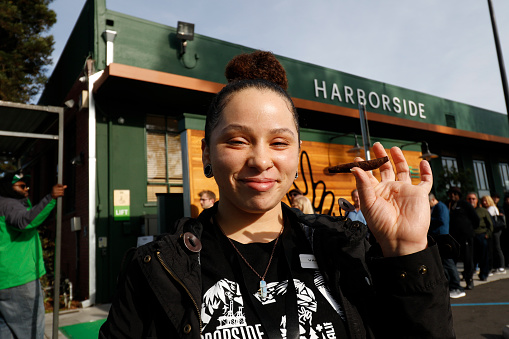Black Women In Marijuana Go Green To Diversify Budding Industry
The Black Women Who Are Going Green
No two days are the same for Kebra Smith-Bolden.
The founder and CEO of CannaHealth spends three days a week at her clinic in New Haven, Connecticut, where she and her staff of nurses help her clients navigate state law in order to become certified medical marijuana patients.
The cannabis nurse educator also takes time each week to speak to church groups and traditionally underserved communities – including people on probation and parole – about marijuana, its benefits and how to get access to it without breaking the law.
And as deputy director of the state’s branch of National Organization for the Reform of Marijuana Laws, or NORML, she meets with politicians to advocate for cannabis on the legislative level.
“Although this is weed, it’s not easy,” Smith-Bolden said. “It’s not simple. There are a lot of elements involved and it’s not for the faint of heart.”
Smith-Bolden is part of a growing number of African-American women who have become pioneers in the country’s burgeoning cannabis industry. More and more black women are becoming marijuana entrepreneurs, creating dispensaries, launching CBD product lines and selling edible cannabis products and weed-themed merchandise.
“Everything is moving rapid fire, and that’s why I tell people to be ready to play the game,” Mary Pryor, who has her own CBD product line and cofounded of Cannaclusive, which aims to diversify the cannabis industry, said. “I feel that this is the last chance for generational wealth. I feel it in my bones.”
Retail marijuana sales in the United States are expected to soar to $10 billion in 2018 – a 50 percent increase over the year before, according to a report from Marijuana Business Daily. The report says that pot profits will continue to climb to a projected $22 billion a year by 2022.
Marijuana is now legal for medicinal use in 30 states and available for recreational consumption in nine as well as the District of Columbia. And with many other states set to relax rules around marijuana consumption, many women of color said now was as good as any time to get into the cannabis biz.
For entrepreneur Dasheeda Dawson, that meant leaving her career in the corporate world to launch MJM Strategy, a consultancy that helps businesses and municipalities navigate the cannabis marketplace with an emphasis on diversity in the industry and reinvestment in people harmed by the War On Drugs. Along with running her own marijuana business blog, www.theweedhead.com, Dawson is also the president of Flora Buffalo, a high-tech cannabis campus centered on growing, testing and selling the plant.
“With such a new industry, I have an opportunity to become an influencer and help people change their mind about what they think a cannabis user is,” Dawson said. “It’s been a whirlwind, but I love being an entrepreneur and think I’m fulfilling a passion.”
Some 25 years after the height of the U.S.’s War On Drugs – some African American women see the cannabis industry not only as a way to build a wealth stream that can be passed on to daughters and sons, but to put their own brand of restorative justice in action in a system that has disproportionately arrested and incarcerated people of color for drug offenses.
But the move to marijuana hasn’t been easy. They’re battling for access to capital, institutional racism and marijuana policy that can be discriminatory to people of color, said Wanda James, the first African-American female dispensary owner in Colorado and the co-founder of Simply Pure, an edibles company.

Source: Francesco Carta fotografo / Getty
Indeed, James’ own brother was locked up over possessing 4.5 ounces of pot, a fact that she said was shocking given that from college onwards, marijuana use was fairly normalized and people she knew consumed it openly.
“Honestly, I had never heard of anybody being arrested for cannabis possession,” James said. “I was shocked that 800,000 mostly black and brown boys were arrested for cannabis.”
When James went into the business 10 years ago, state law barred people with nonviolent drug offenses from becoming cannabis entrepreneurs but allowed those with criminal convictions – including rape and fraud – to get in the business.
“What we didn’t know then that the industry was going to be wrapped in institutional racism that prevented people of color from being involved,” James said. “It became important for us to be able to talk openly about what this was like and be able to get more people involved in the industry.”
Another barrier can be access to hold hard cash. The costs to open a grow house or dispensary can easily jump into the millions of dollars, and that lack of capital can stop African-Americans from going into business, James said.
The solution, she said, is for people of color to consider businesses that are on the industry’s periphery and are indirectly related to cannabis. She likened it to the California Gold Rush, where it wasn’t the miners who got rich, but the saloonkeepers, the hotel owners and the like.

Source: Stephenie Hollyman / Getty
Dawson agreed and said businesses like hers are the next wave in the cannabis industry.
“There’s no roadmap,” Dawson said. “People think that you have to open a dispensary to get into the industry. But the reality is the best opportunities are in the ancillary businesses.”
Their advice for other women looking to get into the biz? Educate yourself, network and be open to a business that may not necessarily be directly involved with growing or selling cannabis.
“If you want to do this, you can do this,” Pryor said. “You do not need to touch the plant…You don’t have to have a dispensary or extraction facility, you can have an ancillary space and still be rocking.”
WATCH THE ONE STORY VIDEO:
Women And Weed Part I: Barriers To Entry
















